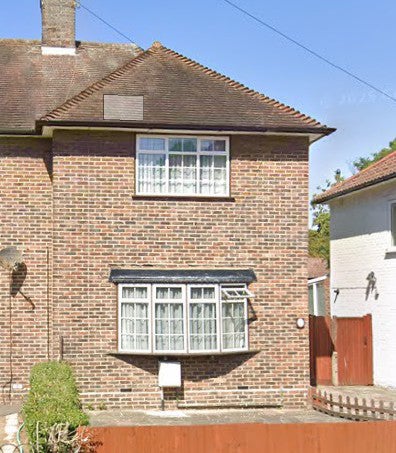
Two nephews are locked in a £400,000 fight over the fortune of a widow, who disinherited one side of her family after they suggested she go into a care home.
Doreen Stock, who did not have any children, died in 2021 aged 86.
She left her entire estate to her nephew, Simon Stock, and his wife Catherine, who lived close to her south London home.
Mr Stock claimed he had been like a son to Doreen – but the will is now under challenge in court after Doreen’s great-nephew, 39-year-old Ben Chiswick, launched a bid to inherit it himself.
Ben, a propulsion engineer who is based in Michigan, US, had been due to inherit her fortune under a previous will written in 1986 when he was a baby, but was dramatically disinherited by his great-aunt a year before her death after his parents suggested Doreen spend time in a care home.
He is fighting to reinstate the previous will, claiming Doreen, who he says was a “fixture in his childhood”, was too stricken by dementia to properly understand what she was doing when she changed her wishes.
However, the Stocks are fighting the case, claiming Ben – who has lived in the US since 2017 – had no "meaningful relationship" with Doreen beyond his early years.

Simon, meanwhile, had been “the nearest thing to a son she had”, they said.
Sitting at Central London County Court, Judge Jane Evans-Gordon heard that "independent" and occasionally "stubborn" Doreen had a deep emotional attachment to her home in Charminster Road, Mottingham, having shared it with her husband Samuel until his death in 2001.
Doreen's first will, made in 1986, ultimately left her estate to Ben, the son of her niece Patricia Chiswick and husband Brent.
The estate principally contains the Mottingham house, which is valued online at about £400,000.
The court heard Doreen had had a good relationship with the Chiswicks, who helped her with her shopping and visited her regularly.
She even made a lasting power of attorney in their favour, but before she died she revoked the document and changed her will, leaving everything to a nephew on her husband's side: tax advisor Simon Stock and his wife Catherine.
Challenging the will, Ben Chiswick claims that his great-aunt's dementia in her final years means there is serious doubt whether she had the necessary capacity to make the changes.
He said the fact there was no discussion with his side of the family about the new will suggested "something not right" about her change of mind.
"Doreen and I had a really happy relationship and she understood that leaving her estate to me would make a massive difference to my life," he said in his evidence.
Barrister James McKean, for Simon and Catherine, told the court that Doreen had also been close to Simon, contributing to his school fees as a child.
Although she previously had a close relationship with Ben's parents, that was ruined when they suggested she go into a care home in 2019, the court heard.

To make matters worse, Patricia had then arranged for a "capacity assessment" for her aunt, which the barrister said led to Doreen fearing her independence was being threatened and ultimately changing her will.
There had been "building resentment" with the way her power of attorney was being administered, which "finally boiled over in the summer of 2019 when the Chiswicks made an ill-judged – though perhaps well-intentioned – suggestion to Doreen that she spend a period in residential care”.
“Doreen was, by all accounts, jealously independent. It is little wonder that she found the proposition to be alarming and offensive," the barrister said.
“No doubt Doreen was worried about the prospect of going into a home, then was asked to undergo the capacity assessment, and put two and two together."
Within weeks of the assessment, which resulted in a report stating she "lacked capacity", she had begun steps to revoke the power of attorney and make a new will in Simon and Catherine's favour, he told the judge.
Quizzing Patricia Chiswick in the witness box, he added: "Doreen loved her home and it had been her and Samuel's home before his death. There was a deep emotional connection to that property.
"Saying to Doreen that she should leave that property and spend some time in a care home was offensive to her, wasn't it?
"From Doreen's perspective, this must have looked a real threat to her independence."
But Patricia denied upsetting the pensioner, insisting that the plan was only ever for a short break in a care home while she and her husband went on holiday.
"It was simply a suggestion because we don't usually go away for three weeks at a time, and I think she had been quite unwell and her health was deteriorating in general," she said.
"I was concerned about leaving her and I thought it would be quite nice if she could go somewhere where she could be looked after while we were away.
"It was absolutely stressed that it was for three weeks. There was no suggestion she was going to stay there indefinitely."
The Chiswicks did not visit Doreen again between the capacity assessment in 2019 and her death in May 2021.
For Patricia's son Ben, who is the claimant in the case, barrister Simon Lane said that, at the time she made the new will, she was “vulnerable and was behaving out of character”.
The 2019 assessment conducted after the suggestion of a care home move had resulted in an expert's finding that she "lacked capacity", he said.
But Mr McKean said the assessment was deficient, with Doreen answering with "prickly hostility" when she was quizzed about things that made no sense to her, such as a fire which never actually happened.
Other assessments around the same time had resulted in findings that she did have capacity, although she was suffering with "mild" dementia, he said.
"Doreen may have had some memory problems, but capacity and memory are different beasts," he said.
"The court will struggle to find any evidence of impaired cognition or reasoning. On the contrary, Doreen’s behaviour, values and reasoning were consistent and plausible at all times."
He said there was reason for her to decide to change her will, the last being made more than 30 years previously, and that by then Ben – living and working on the other side of the Atlantic – would have been "far from her mind as a beneficiary".
He had not seen her again or even spoken on the phone after moving to the US, while most of the evidence of their relationship came from when he was a child.
On the other hand, Simon and Catherine had been able to visit her regularly, living not far from her in Eltham, south London, he said.
"The court can be surprised neither by the making of the disputed will, nor by Doreen’s choice of beneficiaries," he added.
The judge is expected to give her ruling on the case at a later date.
Scientists link gut bacteria to early stages of Parkinson’s disease
How high is your risk of dementia? It may depend on where you live
Diner’s £100k claim over ‘runaway truffle’ after fall at Michelin-listed restaurant
Tribute paid to former bus driver killed alongside wife in cliff fall
Sir Sadiq Khan and King banter over being workaholics during knighthood ceremony
Am I eligible for winter fuel payments and how much can I get?







